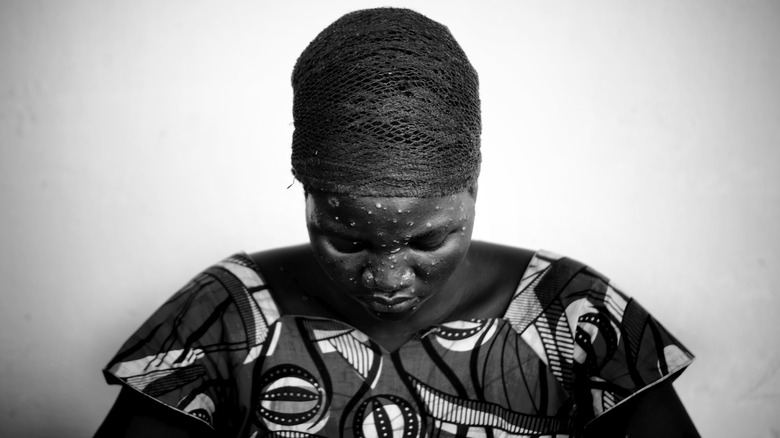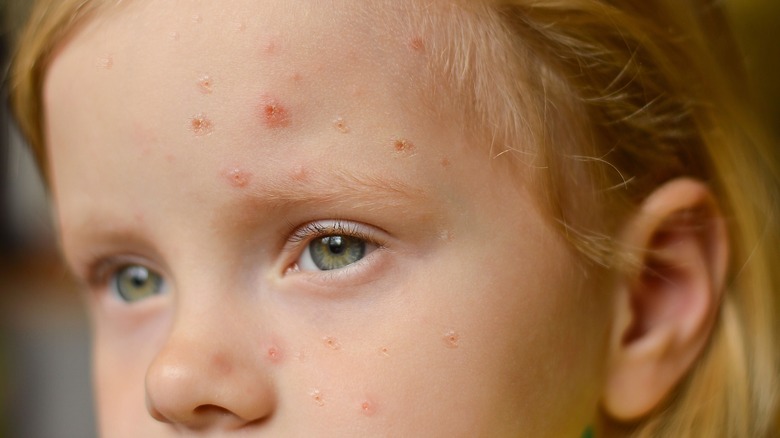This Podcast Will Kill You's Erin Welsh & Erin Updyke On What We Do And Don't Know About Monkeypox - Exclusive
The latest data from the Centers for Disease Control and Prevention (CDC) shows that there are now more than 11,000 confirmed cases of monkeypox in the United States. Cases of monkeypox, which is related to the virus that causes smallpox, have historically been limited to Central and Western Africa, per the CDC. Widespread outbreaks like the ones happening in the U.S. and parts of Europe are unusual for the virus. The CDC is closely monitoring the spread of monkeypox in the U.S., but there's still a lot that scientists don't know about the current outbreaks and why monkeypox is spreading so rapidly.
To get a better understanding of monkeypox and the unique nature of these outbreaks, epidemiologists Erin Welsh and Erin Updyke, the team behind "This Podcast Will Kill You," decided to do a deep dive on the virus. Health Digest sat down with the Erins to talk about what they learned while they were researching the episode, what we know about monkeypox, and what we still have to figure out.
Monkeypox has been around for a long time
Erin Welsh and Erin Updyke both emphasized that they're not experts on monkeypox. They learned a lot during their research for the episode, especially about the disease's history. Updyke explained that though this may be the first time that Americans are hearing about the virus, it isn't new at all.
"This is a virus that we've known about for many decades," she said. "We've known that it has the potential to transmit from animals to humans, as well as from person to person."
The long history of the virus means that there's existing research on monkeypox, which will help scientists better understand these current outbreaks. However, the virus is currently behaving in ways that scientists haven't seen before.
"It is spreading in ways that are completely novel," Updyke said. "This is a much larger outbreak than anything that we've ever seen before."
She explained that when the first human case was discovered in the 1970s, the majority of the global population was vaccinated against smallpox. That vaccine also protected against monkeypox. The high global vaccination rate kept monkeypox outbreaks small and isolated for decades. Since people no longer get vaccinated for smallpox because it was eradicated, there's less population-level protection from monkeypox. Updyke posited that this may be contributing to the current outbreaks.
Who's at risk?
Erin Welsh and Erin Updyke stressed that scientists still don't know how and why monkeypox is spreading so quickly right now, which has led to a lot of misinformation about who's at risk.
"So far, the majority of people that ... have been identified as being positive for monkeypox, are in the public health category known as 'men who have sex with men,'" Updyke explained. "There's a lot of questions as to whether this is now a sexually transmitted disease ... We have known for a very long time that this is a virus that's spread by close physical contact ... Sexual contact is one type of contact. Stigmatizing certain groups or assuming that this is only spread by sexual intercourse is problematic because we are likely missing spread."
Welsh added, "There has been this assumption that, 'I am not in that category, so I am not at risk.' That is where we are going to see a lot of problems ... Almost anyone, potentially, could be at risk if you have direct contact, close contact, with someone who has monkeypox."
Updyke and Welsh reiterated that there's still a lot we don't know, and new information will be emerging rapidly as public health organizations track outbreaks — so it's crucial to follow updates from the CDC and the World Health Organization (WHO).
This Podcast Will Kill You airs on the Exactly Right Media Network ("My Favorite Murder," "Adulting with Michelle Buteau and Jordan Carlos") and is available wherever you listen to podcasts.



